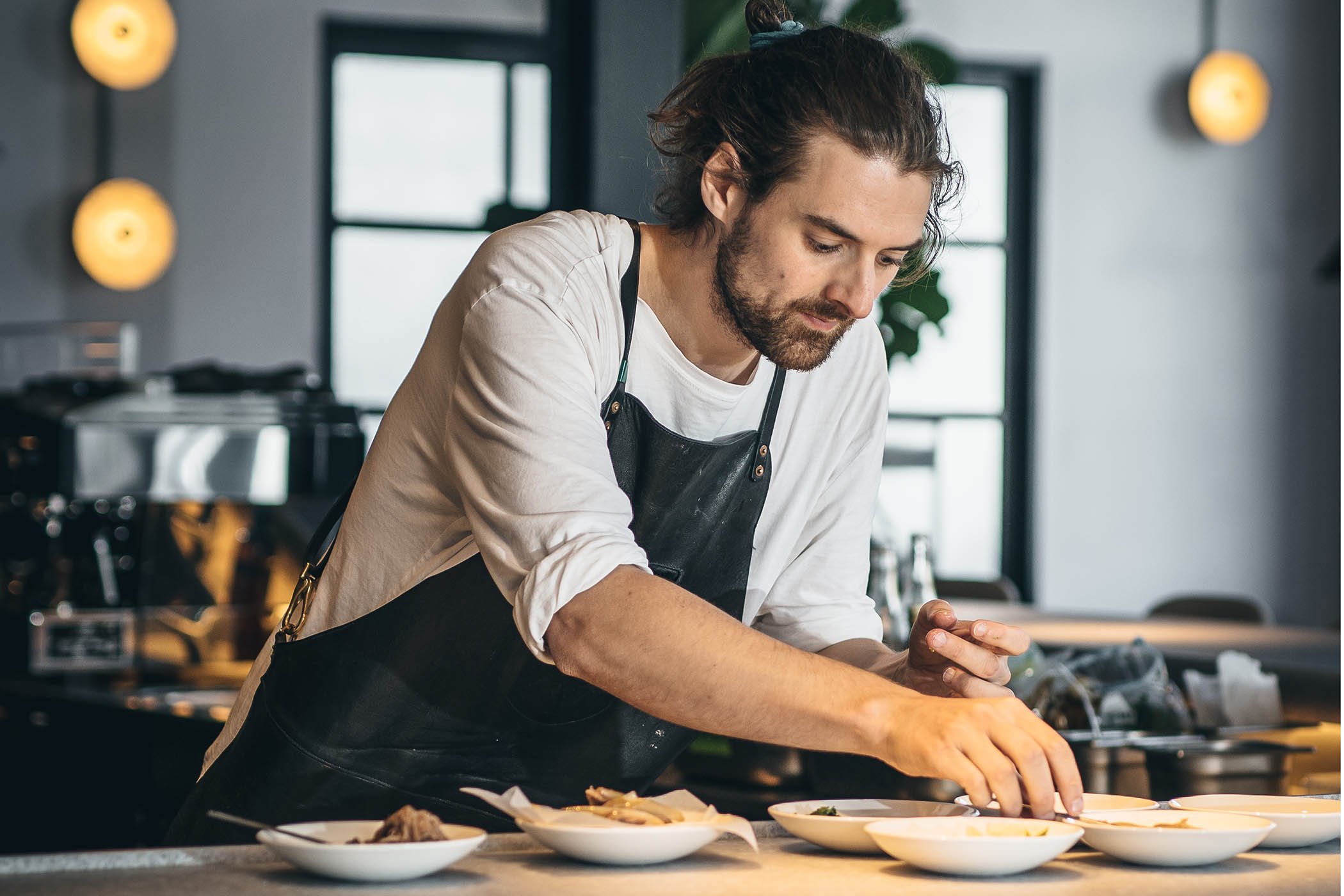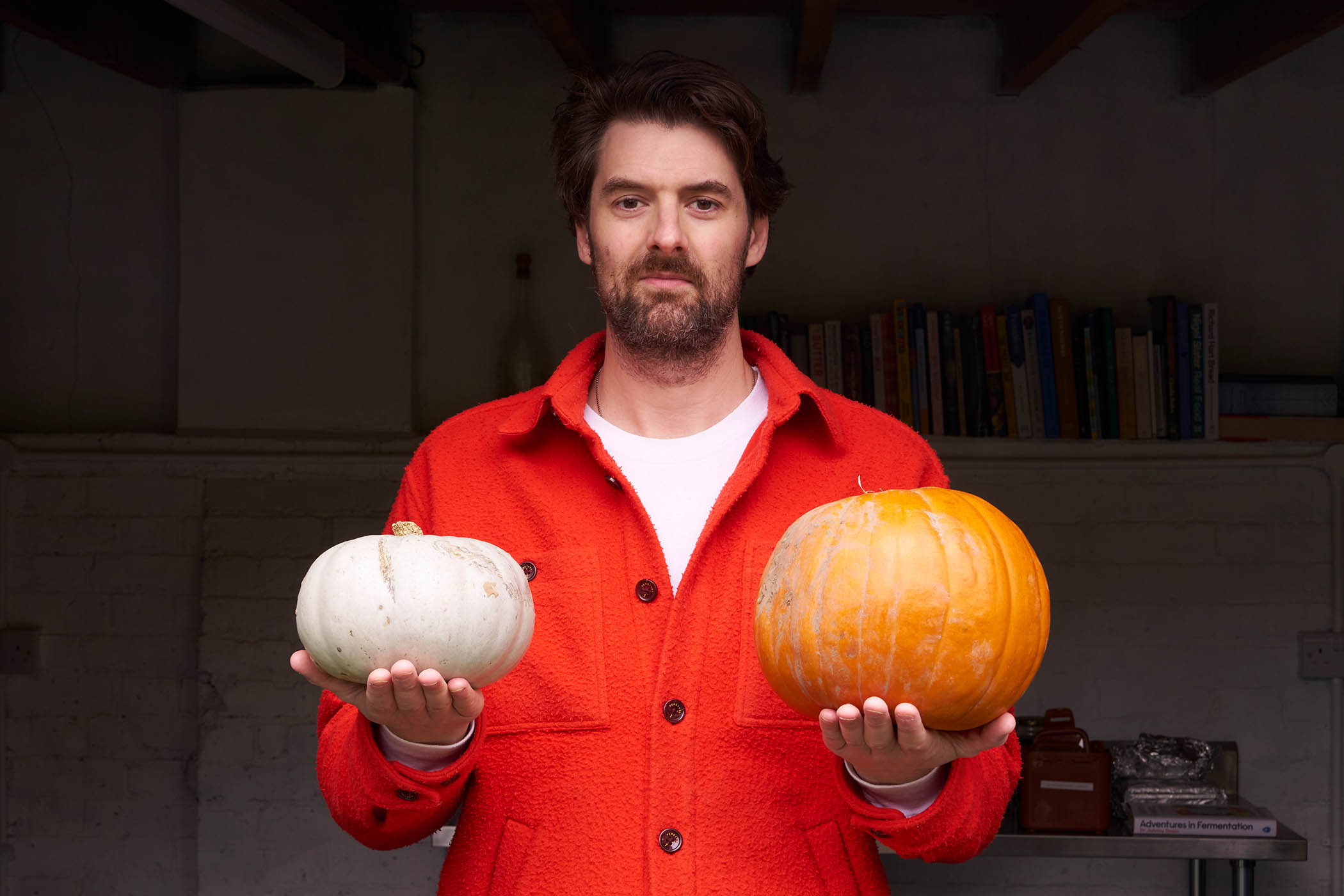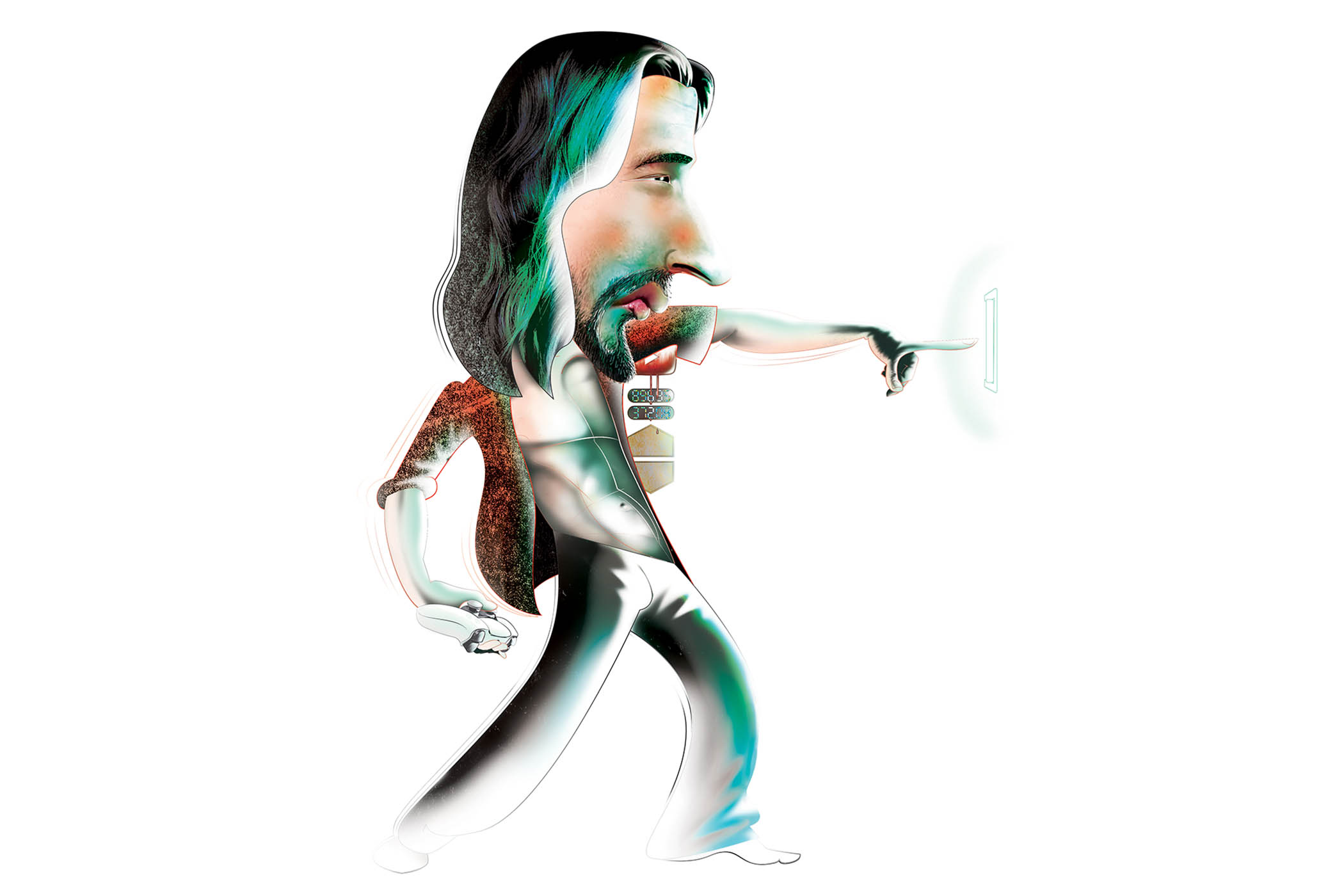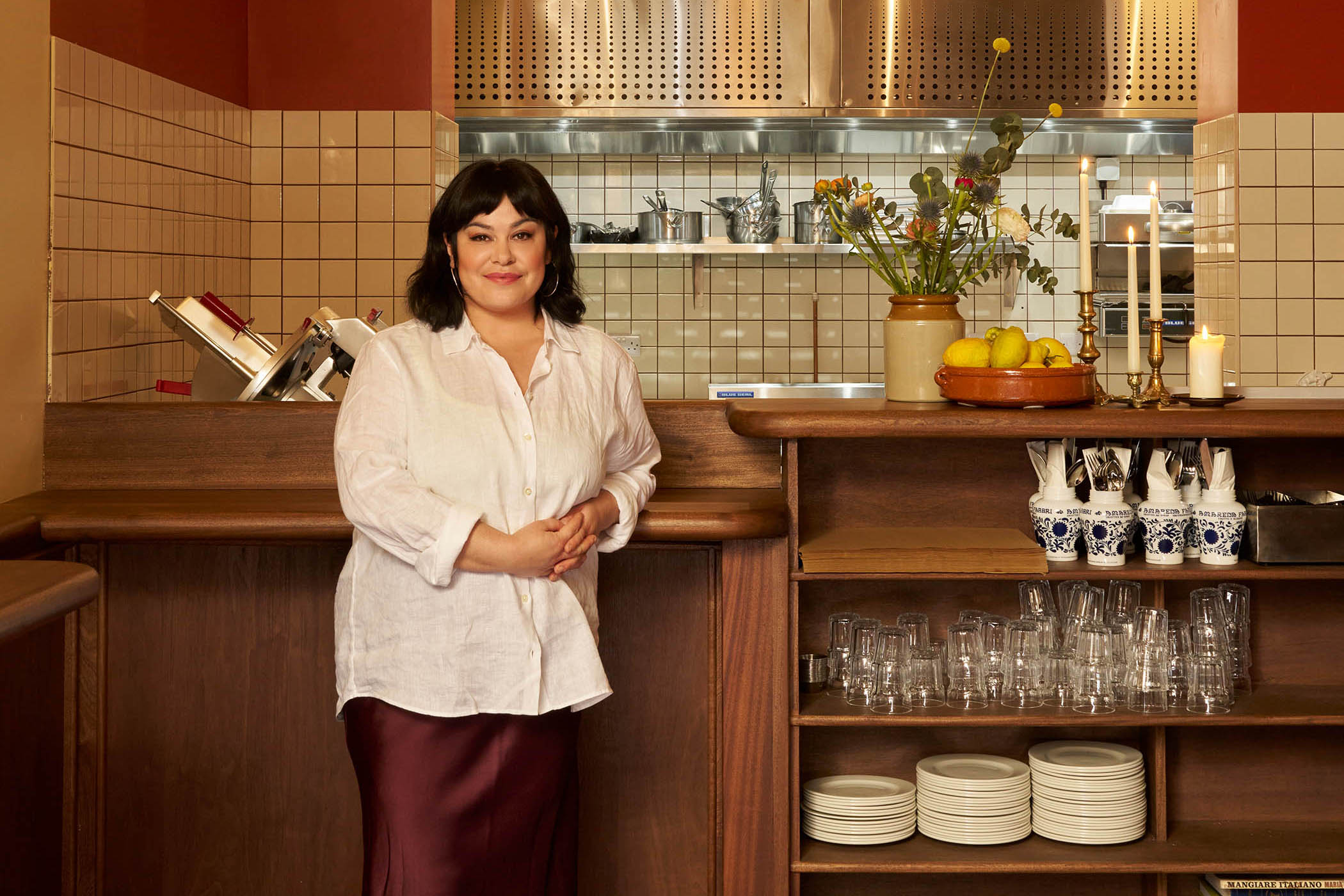Photograph Suki Dhanda
You don’t forget a name like Dr Johnny Drain, and the sight of him lingers, too. Rangy, beardy, a genial Brummie, he looks more like the keyboard player of an indie quintet than one of the sharpest minds in modern food. He is, remarkably, both. “It’s hard to explain what I do,” he tells me. “I’m a scientist, a chef, a designer, an artist, a musician, an entrepreneur. I’m a career chameleon.”
What is clear is his authority. Noma’s René Redzepi calls him a “microbial poet”. His expertise is valued at the highest levels of gastronomy. We’re standing inside his spartan laboratory in Deal, amid juicers, dehydrators and almost 200kg – one-fifth of a ton – of home ferments, some a decade old. Drain has just hosted Karol Ploch, recipient of the 2024 Roux Scholarship, awarded annually to the best British chef under 30. “He spent three weeks at RyuGin in Tokyo, three weeks at Geranium in Copenhagen, then a week in my shed,” he laughs. “This year’s scholar is also coming here, so it can’t be too shabby.”
Drain, 42, has built a career teaching chefs to embrace scientific principles and, most often, microbes – the subject of his first book, Adventures in Fermentation, part biography and part manifesto for the power of bacteria. “It may seem that humans are the bosses here,” he writes, “but as we peer both downwards into the realm of the microscopic, and rearwards into the history of the planet, we will see that it is we who have been shaped by microbes. We are living in a microbial world.”
It crowns a CV of absurd variety: degrees from Bristol, Imperial and Oxford, the latter a PhD in computational materials science; being styled by Prada for a fermentation class; a record deal for his synth-pop duo with the cult indie label Mute; co-founding a magazine dedicated to mould; raising £3.5m for his cocoa-free chocolate start-up. He has built, he reckons, “50 or so” laboratories for chefs from Provence to Paraguay. “I’ve started describing myself as the secret weapon of the world’s Michelin-star restaurants,” he says. It’s a thrill, “showing up with my suitcase and doing this work, then disappearing, knowing that something we worked on is running through the backbone of their menu.”
There is, predictably, a story behind every burbling tub and cloudy yellow jar on Dr Drain’s laboratory shelf – enough for him to list “storytelling” as yet another of his many professional guises. Some are arranged in vertical samples, “vintages” to be tasted year on year, flavour notes dutifully tabulated on notepads or grimy whiteboards. Many exist to show how easy and replicable this form of culinary homebrewing can be – sake made with supermarket rice, miso from tinned chickpeas. Others are there to demonstrate the extreme, like the 20-year-old smen he proudly offers up to me – a fermented butter from Marrakech with a lactic tang that verges on fieriness. “Parmesan on steroids,” he says, grinning.
Drain thrives where disciplines meet, a trait he discovered as a child, aware he was “good at joining dots that other people might struggle to”. He felt an early affinity to food, beguiled by “exotic” ingredients such as Vesta chow mein and Amoy soy sauce. “I remember asking my parents, ‘Can we buy this thing called Chinese five spice?’ which, now, is not remarkable, but they were like, ‘Where are you getting this stuff from?’”

‘I’m a huge introvert. I can quite easily not leave the house for 10 days’: Dr Johnny Drain at Silo, 2020. Photograph Lateef Okunno
He dreamed of becoming a chef, wanting to trade school for catering college at 16. His parents, neither of whom had attended university, thwarted that effort. Coaxed back into academia, he was studying chemistry at Bristol when a friend invited him to a guest lecture in the physics department. “I can still picture it,” he says, eyes widening, “this big, old-school wooden-panelled lecture theatre, and down the bottom was Heston.” It was an early preview of the Blumenthal that Britain would soon embrace – aerating chocolate on stage, sharing orange and beetroot jellies with the audience. “It was one of those profound turning-points in my life. I realised people were working at the intersection of the things that I loved.”
Still, he deferred his kitchen dreams. His bachelor’s became a master’s, then he moved into the City as an analyst for Bloomberg, plotting his escape during lunch breaks. “Even when I worked in finance,” he says, “my plan was, ‘I’ll go earn £1m in five years, and then I’ll go and open a restaurant.’” As molecular gastronomy boomed, he studied online guides on the latest cheffy techniques: sous vide, syringes, spherification. Swapping the Square Mile for a doctorate at St Anne’s College, Oxford, he siphoned liquid nitrogen from labs to make ice-cream for housemates.
Eventually, he returned home to Birmingham, asking the one-star Turners of Harborne if he could work for free to get experience. “I approached the chef after lunch service,” he recalls. “He just looked at me and let out this huge sigh, then said, ‘Don’t fucking do that. Don’t waste your time.’” Nevertheless, Drain persisted.
We swap Drain’s shed for his actual kitchen and a brief tour of his condiments. Good soy sauce: not sticky Amoy, thick with caramel colouring, but translucent and mahogany, in a sturdy square-edged bottle marked with kanji brush strokes. Next to it, a chunk of Oaxacan cacao and a spice shaker from a Goan chef at a fusion restaurant in Lithuania. (“If you’re ever in Vilnius,” he tells me, “go to Gaspar’s.” I make a note.)
Kitchen life was a rude awakening at first, as he moved through Birmingham’s most exacting restaurants. “I was this soft boy who’d spent 10 years in an ergonomic chair, now having to graft 12 hours a day.” He can still feel the experience in his knees. His PhD carried little weight with his new colleagues, but the work gave him confidence to email chefs worldwide, pitching his unique position between stove and Bunsen burner. “I emailed 30 restaurants saying, ‘I’m a boffin. I can help you make things more delicious.’ None of them replied, except Noma.”
Drain arrived at Noma in 2014, at the dawn of a new age in fine dining. Scientists, anthropologists and cooks from all walks of life were flocking to Copenhagen, sharing knowledge and recipes, tips and techniques. The restaurant’s staff had converted a houseboat in the harbour into a laboratory, christening it the Nordic Food Lab – a space for their interns to tinker away on various research projects. Drain was on butter; fellow intern Santiago Lastra (now chef patron at the celebrated KOL in Marylebone) mastering the corn tortilla.
Those connections and conversations carried Drain back to London with a flourish, as the capital’s restaurants sought their own taste of the new fermentation trend. Working at Cub bar (from cocktail impresario Ryan Chetiyawardana, aka Mr Lyan), Drain ran riot inside a laboratory in the old men’s toilets, fermenting goat trimmings and salting sticks of rhubarb. This is where I first encountered his creations. You never forget your first lacto-fermented tomato, puckeringly sour yet gently fizzy on a bed of minty fromage blanc – nor a name like Dr Johnny Drain.
Since the pandemic, however, life has settled down a touch. Where once Drain lived on a houseboat in Hackney Wick, he now shares a home in Kent with his wife and young son. It took lockdown for him to realise, despite all appearances, that “I’m a huge introvert. I can quite easily not leave the house for 10 days.” It’s not the only revelation of the last few years: as we speak, Drain has just started taking medication for ADHD. “That diagnosis suddenly makes a lot of sense,” he says, “because I have this kaleidoscopic, very chaotic, busy brain.”
That ADHD diagnosis makes a lot of sense, because I have this kaleidoscopic, very chaotic, busy brain
That ADHD diagnosis makes a lot of sense, because I have this kaleidoscopic, very chaotic, busy brain
The breadth of his back catalogue is a testament to the superpower of a busy brain. Cutting ramen noodles in Japan; brewing sake in Norway; giving lectures on the gut in Italy; making ice-cream and popsicles in Switzerland. Through the tail end of the 2010s, he was drafted to turn any kitchen corner into a lab, although, he clarifies, “lab” is loosely defined. “Sometimes the lab is a cupboard. And normally it’s the cupboard next to the cleaning equipment.” One project brought him to a restaurant in Asunción in Paraguay, where he planned to be for five weeks, but ended up staying for five months, jostling for space with acid-crazed, gun-toting kitchen porters.
These days, with fewer excursions across the planet in the name of flavour science, his energies are now focused beyond gastronomy. He’s launched Win-Win, a food-tech firm, making vegan chocolate from cereals instead of cocoa. And he is soon to lead Hypesound, an Italian start-up researching how to use sound waves in fermentation – from food and pharmaceuticals to coral reef regrowth.
Soon, Drain will be welcoming the next Roux Scholar into his laboratory. “All of these young chefs have amazing palates. But I use this idea of putting on X-ray specs,” he explains. “Instead of seeing a grain of rice, you see carbohydrates with a small amount of proteins and fats. And then you know that if something’s got, say, carbohydrates, you can turn them into sugars and then into wine. It’s about opening the curtains on the food we eat.”
Around us, life proliferates in the jars, the laboratory, the family home: Drain’s world, microbial and otherwise.
Dr Johnny Brain in numbers
3 Number of degrees
500kg Ferments produced in basement of a former London pub
30 Age when he first worked in a commercial kitchen
1 Times arrested at an airport with a suitcase full of ferments
26 Michelin stars his work has contributed to
Newsletters
Choose the newsletters you want to receive
View more
For information about how The Observer protects your data, read our Privacy Policy


